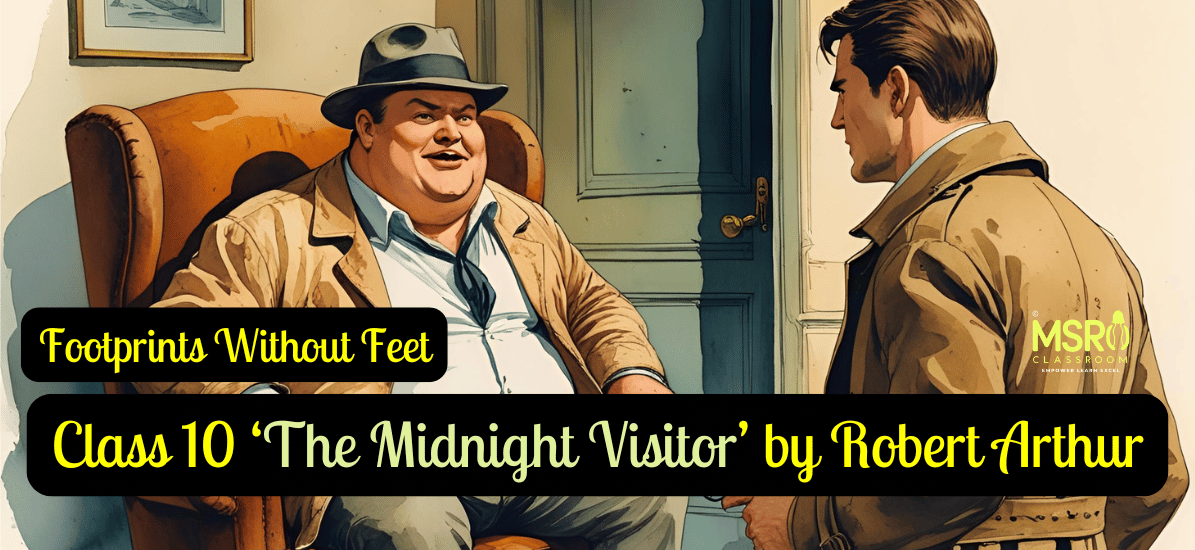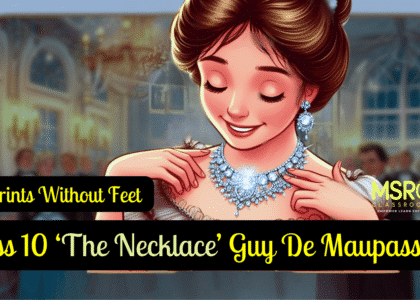Chapter 3, Robert Arthur’s ‘The Midnight Visitor’ Summary, Theme, Character Sketch, Idiomatic Expressions, Important Passages and Question Answers with Extra Questions.
Chapter 3- The Midnight Visitor by Robert Arthur:
Table of Contents
Also Read: First Flight- Class 10 Prose
Vocabulary:
| Deftly: Skillfully and quickly. Disillusioned: Disappointed in someone or something one discovers to be less good than one believed. Gloomy: Dark and depressing. Menacing: Suggesting the presence of danger; threatening. Moodily: In a manner that reflects a gloomy or sullen mood. Nuisance: A person or thing causing inconvenience or annoyance. Passably: To a degree that is acceptable but not outstandingly good. Prosaic: Lacking excitement or originality; dull. Sill: The horizontal piece at the bottom of a window frame. Stammered: To speak with involuntary pauses or repetitions of sounds, often due to nervousness or confusion. Wheezily: With a hoarse or rasping sound, often due to difficulty breathing. White-faced: Pale, often due to shock or fear. Envisioned: Imagined. Let down: To disappoint or disillusion someone. |
Idiomatic expressions present in the story ‘The Midnight Visitor’:
| Scarcely a setting for: Hardly an appropriate environment for. Never altogether lost: Never wholly lost. Raise the devil with: Express extreme anger or frustration towards. Pressing blackly: Appearing darkly. With a rising inflection: With an upward tone. Black with anger: Filled with rage. Romantic adventure: A thrilling and passionate experience. Dark-eyed beauties: Attractive women with dark eyes. Quite a start: A significant surprise or shock. He took his chances: Risked his safety or well-being. |
Summary ‘The Midnight Visitor’:
In ‘The Midnight Visitor’ by Robert Arthur, disillusioned writer Fowler meets supposed secret agent Ausable, expecting intrigue but finding only a mundane evening. However, their encounter turns thrilling when a mysterious man named Max appears, aiming to steal essential documents from Ausable. As tension rises, the police knock on the door, but Ausable reveals it’s a ruse.
Max, attempting to escape via a balcony, falls to his apparent demise. Yet, to Fowler’s shock, there was never a balcony. Ausable orchestrates the scenario to outsmart Max, leaving Fowler bewildered by the unexpected twist.
Theme ‘The Midnight Visitor’:
Don’t Judge a Book by Its Cover:
“Never judge a book by its cover” is the running theme in ‘The Midnight Visitor.’ The story demonstrates how initial impressions of characters, such as Ausable, can be misleading. Ausable, with his unassuming appearance and ordinary activities, is shown to be involved in espionage and possesses cunning intelligence. Similarly, Max, who initially appears menacing, is ultimately outwitted by Ausable’s clever deception.
The story highlights that true character and intentions may not be immediately apparent, and it cautions against making hasty judgments based solely on outward appearances. Instead, it encourages deeper exploration and understanding before forming conclusions about others.
For more information on the theme, please refer to the video below.
Explanation of ‘The Midnight Visitor’ for Auditory Learners:
Duration: 12 minutes
Exam-oriented, Concise, Note-Style
Character Sketch:
Character Sketch of Ausable:
Appearance:
- Fat and unassuming in physical appearance.
- Maintains a somewhat sloppy demeanour.
Background:
- Originally from Boston, with an American accent despite living in Paris for twenty years.
- Engaged in espionage and secret intelligence work.
Personality:
- Cunning and intelligent, despite his unassuming exterior.
- Displays a sense of humor and wit, as seen in his interactions with Fowler.
Skills and Abilities:
- Skilled in espionage and manipulation, able to outsmart adversaries.
- Possesses knowledge of multiple languages, including French and German.
Resourcefulness:
- Demonstrates the ability to adapt to unexpected situations, such as when Max intrudes into his room.
- Utilises clever tactics, such as arranging for a fake police visit as a security measure.
Professionalism:
- Despite the unconventional circumstances, he remains focused on the task at hand.
- Takes precautions to safeguard sensitive information, as seen in his handling of the “important paper.”
Unpredictability:
- Keeps his true intentions and capabilities hidden, surprising others with his actions and insights.
- Masters the art of deception, using misdirection to achieve his goals.
Moral Ambiguity:
- Engages in morally ambiguous activities due to his involvement in espionage and intelligence work.
- Balances the need for secrecy and security with ethical considerations.
Complexity:
- It reveals layers of complexity beyond his initial appearance, showcasing the depth of his character.
- Challenges stereotypes and preconceptions, highlighting the theme of not judging based on outward appearances.
Character Sketch of Fowler:
- Idealistic: Fowler is depicted as a youthful, romantic, and idealistic character with a romanticised view of espionage and adventure. His eagerness to meet Ausable suggests a longing for excitement and intrigue.
- Disillusioned: Throughout the story, Fowler experiences disillusionment as his expectations of espionage and danger clash with the reality of Ausable’s unassuming appearance and mundane activities.
- Observant: Fowler demonstrates curiosity and observational skills as he follows Ausable and converses with him. He is keen to understand the situation unfolding before him.
- Adventurous: Fowler experiences a mix of surprise and thrill when he realises the true nature of Ausable’s activities. His initial disappointment transforms into authentic excitement as the story progresses.
- Nervous and Confused: Fowler’s nerves are evident when confronted with Max’s unexpected presence and the tense situation in Ausable’s room. He stammers and struggles to comprehend the unfolding events.
- Open-minded: Despite his initial disillusionment, Fowler remains open-minded and adaptable as he navigates the story’s twists and turns. He is willing to reassess his perceptions and accept the unexpected truths revealed to him.
- Symbolic Role: Fowler serves as the audience surrogate/proxy, representing the reader’s journey of discovery and realisation throughout the story. His reactions mirror those of the reader as they uncover the truth alongside him.
Question Answers ‘The Midnight Visitor’:
Comprehension Questions:
| Q1: How is Ausable different from other secret agents? A1: Ausable is different from other secret agents because he doesn’t fit the typical spy image. He is described as fat and doesn’t possess the glamorous qualities often associated with secret agents. He lacks the exotic allure and adventurous lifestyle usually depicted in spy stories. Q2: Who is Fowler and what is his first authentic thrill of the day? A2: Fowler is a character in the story accompanying Ausable, who expects to experience thrilling adventures with a secret agent. His first authentic thrill of the day occurs when he sees a man holding a small automatic pistol in the room. This unexpected sight fills Fowler with a sense of danger and excitement. Q3: How has Max got in? A3: Max got into the room through the window using a passkey. He accessed the balcony from the neighbouring apartment and then entered Ausable’s room through the window. Q4: How does Ausable say he got in? A4: Ausable says that Max got in through the balcony. However, Ausable later reveals that there is no balcony, indicating that Max’s entry into the room was part of a deception orchestrated by Ausable. |
Think About It:
Q1: “Ausable did not fit any description of a secret agent Fowler had ever read.” What do secret agents in books and films look like, in your opinion? Discuss in groups or in class some stories or movies featuring spies, detectives and secret agents, and compare their appearance with that of Ausable in this story.
A1: Secret agents in books and films are often depicted as sophisticated, charismatic, and physically fit individuals. They typically possess exceptional skills in espionage, combat, and intelligence gathering. Characters like James Bond, from the famous spy series, are often portrayed as stylish and sophisticated, with a taste for luxury and adventure.
Sherlock Holmes, Hercule Poirot, and Miss Marple are renowned detectives who rely on their intellect and deductive reasoning to solve mysteries, rather than physical prowess. In contrast, Ausable in this story is described as fat and doesn’t fit the typical image of a secret agent. The setup challenges the conventional portrayal of spies and detectives in fiction, highlighting the diversity of characters in literature and film.
Q2: How does Ausable manage to make Max believe that there is a balcony attached to his room? Look back at his detailed description of it. What makes it a convincing story?
A2: Ausable makes Max believe that a balcony is attached to his room by providing a detailed and plausible explanation. He mentions that the room used to be part of a larger unit with a living room and a balcony. Ausable explains that someone could access the balcony from the neighbouring apartment and then enter his room through the window.
This story is convincing because it incorporates specific details about the layout of the building and uses real-life scenarios, such as shared balconies in apartment buildings, to support Ausable’s claim. Ausable’s frustration with the management for not blocking off the balcony adds authenticity to his account, making it seem more believable to Max.
Q3: Looking back at the story, when do you think Ausable thought up his plan for getting rid of Max? Do you think he had worked out his plan in detail right from the beginning? Or did he make up a plan taking advantage of events as they happened?
A3: Based on the story’s events, Ausable likely devised his plan for getting rid of Max shortly after realising Max’s intentions. It’s possible that Ausable had a general idea of how to handle the situation from the beginning, given his experience as a spy.
However, he likely improvised and adjusted his plan based on the unfolding events in the room. For example, Ausable’s decision to involve the police as an extra precaution suggests that he was actively strategising and adapting to the situation as it progressed. While Ausable may have had a rough plan outline, the specifics were likely developed in response to the events as they happened.
Talk About It:
Q1: In this story, Ausable shows great ‘presence of mind,’ or the ability to think quickly, and act calmly and wisely, in a situation of danger and surprise. Give examples from your own experience, or narrate a story, which shows someone’s presence of mind.
Sample:
| Once, while walking home from work, I witnessed a chain-snatching incident. Without hesitation, a nearby shopkeeper sprang into action. He swiftly grabbed a nearby bucket of water and splashed it on the chain snatcher, causing him to lose his balance. Seizing the opportunity, the shopkeeper tackled the thief and restrained him until the police arrived. The shopkeeper remained composed and acted decisively amidst the chaos, ensuring the thief was apprehended and justice served. His quick thinking and calm demeanour prevented further harm and brought the situation under control efficiently. It demonstrated the remarkable presence of the mind in a moment of danger and surprise. |
Q2: Discuss what you would do in the situations described below. Remember that presence of mind comes out of a state of mental preparedness. If you have thought about possible problems or dangers, and about how to act in such situations, you have a better chance of dealing with such situations if they do arise.
• A small fire starts in your kitchen.
A: If a small fire starts in my kitchen, I would try to assess the situation calmly. Then, if safe, I would immediately turn off the stove or any other heat source and try to extinguish the fire using a fire extinguisher or a blanket. If the fire is too large to handle, I would evacuate everyone from the house and call the fire department for help.
• A child starts to choke on a piece of food.
A: If a child starts to choke on a piece of food, I would first encourage them to cough to try to dislodge the object. If coughing doesn’t work, I will perform the Heimlich manoeuvre by standing behind the child, wrapping my arms around their waist, and giving quick thrusts to their abdomen until the object is expelled.
• An electrical appliance starts to hiss and gives out sparks.
A: If an electrical appliance starts to hiss and give out sparks, I would immediately unplug it from the power source and switch off the main power supply to prevent any potential electrical fire. I would then move away from the appliance and call a professional electrician to inspect and repair it.
• A bicycle knocks down a pedestrian.
A: If a bicycle knocks down a pedestrian, I would first check if the pedestrian is injured and provide any necessary first aid. I would then help the pedestrian to a safe place and exchange contact information with the cyclist. If the pedestrian is seriously injured, I would call for medical assistance immediately.
• It rains continuously for more than twenty-four hours.
A: If it rains continuously for more than twenty-four hours, I will monitor the situation closely for signs of flooding or landslides. I will prepare emergency supplies such as food, water, and flashlights in case of power outages. I will also stay informed about weather updates and evacuation routes provided by local authorities.
• A member of your family does not return home at the usual or expected time.
A: If a family member does not return home at the usual or expected time, I would contact them via phone or text. If I cannot reach them, I would check with their friends or colleagues to see if they have any information about their whereabouts. If I cannot locate them, consider contacting the police for assistance.
Extra Questions ‘The Midnight Visitor’:
Short Answer Type Questions:
Q1: Who is Ausable, and how does he differ from the typical image of a secret agent?
A1: Ausable is a secret agent, yet unlike the typical portrayal, he’s overweight and lacks the suave demeanour associated with spies. He doesn’t engage in glamorous espionage activities but mundane tasks like attending a French music hall. His appearance and methods subvert the traditional image of a secret agent.
Q2: What event causes Fowler’s first genuine thrill of the day?
A2: Fowler’s first genuine thrill occurs when he sees a man holding a small automatic pistol in Ausable’s room. The unexpected sight, coupled with Ausable’s reaction, breaks the monotony of the evening, marking a significant deviation from Fowler’s expectations and injecting real tension into the situation.
Q3: What is Max’s intention regarding the report being brought to Ausable?
A3: Max’s intention regarding the report being brought to Ausable is to retrieve it for himself. Max seeks to obtain sensitive information as a rival agent to prevent it from falling into Ausable’s or his organisation’s hands. It reflects the high-stakes competition and covert operations often present in intelligence gathering and espionage.
Q4: How does Ausable explain the knocking at the door?
A4: Ausable explains the knocking at the door as an anticipated visit from the police, whom he claims he informed to provide extra protection for the vital document they expect. This explanation is later revealed as a ruse, as no police but a waiter deliver a drink.
Q5: What surprising revelation does Ausable make about the balcony?
A5: Ausable reveals no balcony, contrary to what was previously believed. He explains that the room used to be part of a larger unit with a neighbouring apartment with a balcony. The disclosure/revelation adds a twist to the story and ultimately explains Max’s fate.
Q6: How does Ausable describe the setup of his hotel room and its connection to the neighbouring apartment?
A6: Ausable describes his hotel room as once part of a larger unit, including the neighbouring apartment. The adjacent apartment had a balcony that extended under Ausable’s window. The setup allows access to Ausable’s room through the balcony, which becomes significant in the story’s unfolding events.
Q7: What is Max’s reaction when he realises the police are at the door?
A7: When Max realises the police are at the door, he reacts angrily and panics. He swiftly backs towards the window, threatening to shoot if Ausable doesn’t comply with his demands. Max’s reaction highlights the high stakes and tension of the situation as his plans unravel unexpectedly.
Q8: How does Ausable’s guest, Fowler, react to the unfolding events?
A8: Fowler reacts with shock and confusion to the unfolding events. He stands stiffly as Max threatens Ausable and later expresses disbelief and confusion when the waiter enters instead of the police. Fowler’s reactions highlight his bewilderment and the unexpected twists in the situation.
Q9: What role does the waiter play in the story’s climax?
A9: The waiter’s role in the story’s climax is crucial, as his unexpected appearance disrupts Max’s plans. He enters the room at a critical moment, revealing that no police are outside. The revelation catches Max off guard, leading to his eventual downfall and resolution of the suspense.
Q10: How does Ausable explain Max’s fate at the end?
A10: Ausable explains that Max won’t return because he has no balcony to escape. Max’s attempt to flee through the window leads to his demise, suggesting that he likely fell to his death. Ausable’s explanation resolves the mystery surrounding Max’s fate and the absence of the balcony.
Q11: What does Ausable reveal about the nature of the “appointment” Max was waiting for?
A11: Ausable reveals that the “appointment” Max was waiting for was a fabrication. There was no appointment; Ausable had orchestrated the situation to lure Max into a trap. The revelation exposes Ausable’s cunning and manipulative nature, highlighting his strategic prowess in outsmarting his adversaries.
Q12: How does Max react when he realises he’s been tricked?
A12: When Max realises he’s been tricked, he reacts with panic and desperation. He swiftly tries to flee through the window, threatening Ausable and Fowler with his gun. Max’s reaction highlights his shock and the dire consequences he faces as his carefully laid plans unravel before him.
Q13: What clues foreshadow the twist regarding the balcony?
A13: Foreshadowing the twist regarding the balcony, Ausable mentions the previous incident where someone accessed his room through the balcony, hinting at its significance. His explanation about the room’s layout and the balcony belonging to the neighbouring apartment subtly sets the stage for the surprise revelation of its nonexistence.
Q14: What does the absence of the balcony suggest about Max’s fate?
A14: The absence of the balcony suggests that Max’s attempted escape through the window would lead to a fatal outcome. Without a balcony to land on, Max’s only means of exit would result in a fall from a considerable height, implying a grim fate for the fleeing spy.
Q15: How does the story’s resolution challenge the reader’s assumptions?
A15: The story’s resolution challenges the reader’s assumptions by revealing that critical elements, such as the balcony and the police presence, were illusions crafted by Ausable. The twist forces readers to reevaluate their understanding of the story, demonstrating the deceptive nature of appearances and the protagonist’s strategic cunning.
Long Answer Type Questions:
Q1: How would you describe Ausable’s appearance and demeanour when Fowler first meets him?
A1: When Fowler first meets Ausable, he finds him to be a somewhat disappointing figure for a secret agent. Ausable appears fat and wheezy, with lingering traces of his American accent despite spending two decades in Paris. His demeanour is calm and even slightly amused at Fowler’s evident disillusionment with the lack of excitement in their encounter.
Ausable’s less-than-imposing appearance doesn’t affect his confidence and composure, which he maintains even when confronted with unexpected intrusions and threats. Ausable presents himself as an unassuming yet intriguing character whose true capabilities are revealed as the story unfolds.
Q2: What were Fowler’s initial expectations of Ausable, and how did they differ from reality?
A2: Fowler’s initial expectations of Ausable were shaped by romanticised notions of secret agents and espionage. He anticipated encountering a figure of intrigue and danger, envisioning mysterious rendezvous, thrilling encounters, and perhaps even dramatic confrontations with adversaries.
However, upon meeting Ausable, Fowler is disappointed to find a man who does not fit the typical image of a secret agent. Ausable is overweight and lacks the suave demeanour Fowler expected. Instead of engaging in covert operations, he spends a mundane evening at a French music hall. The stark contrast between expectation and reality leaves Fowler disillusioned and underwhelmed by the seemingly ordinary nature of Ausable’s life and activities.
Q3: Why does Ausable believe Fowler is disappointed in meeting him?
A3: Ausable believes Fowler is disappointed in meeting him because he fails to live up to the romanticised/idealised/glamourised image of a secret agent that Fowler had likely constructed in his mind. Ausable recognises that as a young and aspiring writer, Fowler likely harboured expectations of encountering a figure of intrigue and danger, someone engaged in thrilling espionage activities.
However, Ausable’s appearance, demeanour, and mundane activities—such as spending a dull evening at a French music hall—contrast sharply with Fowler’s preconceived notions.
Ausable astutely observes Fowler’s frustration and disillusionment, understanding that Fowler had hoped for a more exciting and adventurous encounter. His self-awareness prompts Ausable to offer reassurance to Fowler, hinting at the potential drama and importance of the paper he anticipates/expects receiving later in the evening.
Q4: What dramatic event occurs when Ausable switches on the light in his room?
A4: When Ausable switches on the light in his room, a dramatic event unfolds as Fowler witnesses a man standing halfway across the room, holding a small automatic pistol. This sudden revelation shocks both Fowler and Ausable, marking the arrival of an unexpected intruder, later identified as Max.
The atmosphere instantly shifts from mundane to tense as Ausable reacts with surprise and confusion to Max’s presence. The event serves as a pivotal moment in the story, injecting an element of suspense and danger into what had previously been a relatively ordinary scene.
It sets the stage for the unfolding conflict between Ausable and Max, propelling the story forward and heightening the intrigue surrounding the characters and their motivations.
Q5: Who is Max, and why does he confront Ausable in his room?
A5: Max is a slender individual with features reminiscent of a fox who confronts Ausable in his room, holding a small automatic pistol. He is revealed to be involved in espionage activities and is seeking to retrieve a report concerning new missiles that Ausable expects to receive.
Max’s intrusion into Ausable’s room indicates that he is a rival spy attempting to gain possession of the important document before Ausable can secure it.
His appearance and actions add an element of danger and suspense to the story as Ausable and Max engage in a tense confrontation over the coveted report. Max’s presence highlights the high stakes in the espionage world and introduces a significant obstacle for Ausable to overcome in protecting the valuable information.
Q6: How does Ausable explain the intrusion to Fowler after Max’s departure?
A6: After Max left, Ausable told Fowler that the intrusion wasn’t what it seemed. Ausable explained that Max could not enter the balcony. He clarified that the room used to be part of a larger unit with a balcony from the adjacent apartment, which the management needed to seal off properly.
Ausable expected the police, but he had informed his friend Henry about the situation. This helped to reassure Fowler and clarify the situation. Ausable’s explanation demonstrated his resourcefulness in handling unexpected situations and ensured Fowler’s peace of mind regarding the security of Ausable’s room.
Q7: What role does the waiter play in the story’s climax?
A7: In the story’s climax, the waiter unexpectedly enters Ausable’s room carrying a tray with a bottle and two glasses. His appearance coincides with the heightened tension as Max, the intruder, is still in the room. The waiter’s seemingly innocuous/ harmless actions of delivering a drink create confusion and distraction, allowing Ausable to maintain control of the situation.
However, it is later revealed that the waiter’s presence serves a more significant purpose. His arrival dispels Fowler’s belief that the police were at the door, as the waiter calmly explains that he was simply delivering the drink Ausable had ordered.
The revelation resolves the immediate tension and highlights Ausable’s adeptness at manipulating situations to his advantage, ensuring that Max’s intrusion is effectively dealt with without arousing suspicion from external parties.
Q8: How does Ausable reveal the truth about the balcony to Fowler?
A8: Ausable reveals the truth about the balcony to Fowler by explaining the layout of the room and its history. He clarifies that the room used to be part of a larger unit, with the adjacent apartment containing a balcony that extended beneath Ausable’s window. Ausable further explains that the management had not properly sealed off the balcony, allowing unauthorised access to his room.
This revelation comes after Max’s departure and resolves the immediate tension. Ausable’s explanation dispels any lingering confusion or concern about how Max entered the room and reassures Fowler about the security of Ausable’s accommodations. It also contextualises the events that transpired and highlights Ausable’s astuteness in discerning the true nature of the intrusion.
Important Passages/Lines ‘The Midnight Visitor’:
1. “You are disillusioned,” Ausable told him. “But take cheer, my young friend…………….paper may well affect the course of history. In that thought is drama, is there not?”
Ausable is comforting Fowler, who feels disappointed that Ausable doesn’t fit the glamorous image of a secret agent. Ausable acknowledges Fowler’s disillusionment but assures him they are about to witness something significant. He refers to a paper, likely a document of great importance, for which many people have risked their lives. Ausable suggests that the arrival of this paper could change the course of history, highlighting the drama and significance of the situation.
2. “And as the light came on, Fowler had his first authentic thrill of the day. For halfway across the room, a small automatic pistol in his hand, stood a man.” Here, Fowler experiences a sudden thrill as he realises that an unexpected person is in the room, holding a gun. The scene description emphasises the suspense and danger, as the armed stranger’s presence adds mystery and tension to the situation.
3. “It’s not my balcony,” Ausable said with extreme irritation. “It belongs to the next apartment.” Ausable expresses frustration that someone accessed his room through a balcony that belongs to the neighbouring apartment. This line clarifies the source of Ausable’s irritation and adds context to the story’s setting. It also sets up later events by establishing the presence of the balcony, which becomes important in the story’s unfolding events.
4. “That will be the police,” he said. “I thought that such an important paper as the one we are waiting for should have a little extra protection.” Ausable explains to Fowler that the knocking they hear at the door is likely the police. He adds that he requested the police’s presence to protect the vital documents they expected. This line emphasises Ausable’s cautiousness, the importance of the document they are waiting for, and the sense of urgency in safeguarding it.
5. “Here is the drink you ordered for when you returned,” he said, and set the tray on the table, deftly uncorked the bottle, and left the room.” In this passage, a waiter enters the room and places a tray with drinks on the table. He informs Ausable that the drink is the one he ordered for when he returned. This line illustrates a moment of normalcy amidst the scene’s tension. It also adds a touch of realism to the setting, as it is common for hotels to provide such services to their guests.
6. “But won’t that man out on the balcony…?” Fowler expresses concern about the man they saw on the balcony earlier. He wonders if the man will return and pose a threat to them. This line highlights Fowler’s anxiety and uncertainty about the situation.
7. “No,” said Ausable, “he won’t return. You see, my young friend, there is no balcony.” Ausable reassures Fowler by revealing that there is, in fact, no balcony outside the window. This statement clarifies the misunderstanding regarding the balcony and resolves Fowler’s concerns about the potential threat posed by the man they saw. It also serves as a twist in the story, challenging the reader’s assumptions and adding an unexpected element.
8. “White-faced, Fowler stared after him. ‘But…’ he stammered, ‘the police…’” Fowler reacts with shock and confusion after the man they saw on the balcony screams and disappears. He tries to express his concern about involving the police, but his words falter as he struggles to comprehend what happened. The description of Fowler as “white-faced” indicates his fear and bewilderment, emphasising the moment’s intensity.
9. “Instead, you have spent a dull evening in a French music hall……………door of his room and stood aside to let his frustrated guest enter.”
Here, Ausable reflects on Fowler’s disappointment in their evening together. He contrasts Fowler’s expectations of a thrilling encounter with a secret agent to the mundane reality of their activities, such as attending a French music hall. Ausable chuckling at Fowler’s frustration highlights the disparity between Fowler’s romanticised notions of espionage and the less glamorous reality of Ausable’s life as a spy. This passage characterises Ausable as a pragmatic and perhaps even jaded individual, adding a touch of humour to the story.
10. “The doorknob turned. Swiftly Max pushed with his left hand to free himself from the sill and drop to the balcony. And then, as he dropped, he screamed once, shrilly.” This climatic, action-packed moment describes Max’s attempt to flee the room and evade capture. The description of his scream adds to the tension and urgency of the scene, indicating that something unexpected or alarming has happened. It suggests that Max may have encountered a danger or obstacle as he attempted to escape, leaving the reader curious about what will happen next.





